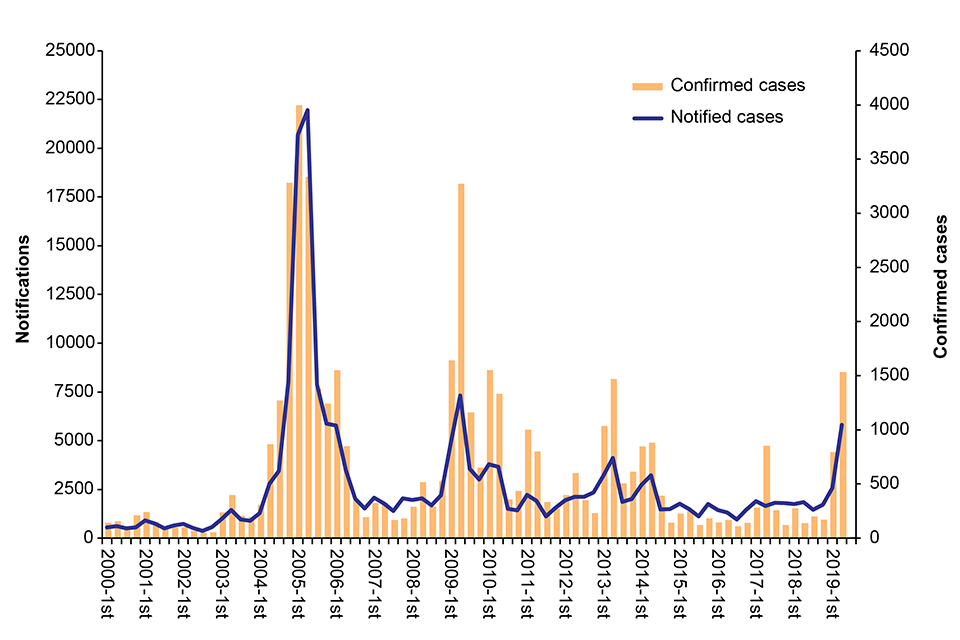HPR volume 13 issue 24: news (12 July)
Updated 20 December 2019
Increase in mumps in England, 2019
A marked increase in mumps notifications has been recorded across England in 2019. In the first five months of the year, 2322 cases of mumps were laboratory-confirmed, compared to 1042 cases in the whole of 2018 (see figure).
Confirmed cases are predominantly in older teenagers and young adults, with 70% (1627 cases) aged between 15 and 25 years.

Mumps notifications and confirmed cases in England, by quarter, 2000 to May 2019 [provisional data for second quarter 2019]
The majority of the laboratory-confirmed cases have been in teenagers and young adults (see table). Cases have been seen across the country, with the highest numbers in the North West and East Midlands.
Laboratory-confirmed cases of mumps by age group and region in England, from January to May 2019
| Region | <1 | 1-4 | 5-9 | 10-14 | 15-19 | 20-24 | 25-29 | 30-34 | ≥35 years | Total |
|---|---|---|---|---|---|---|---|---|---|---|
| East Midlands | – | 2 | 1 | 3 | 105 | 258 | 25 | 24 | 30 | 448 |
| East of England | 1 | 1 | 1 | 5 | 31 | 60 | 20 | 12 | 21 | 152 |
| London | – | 2 | 1 | 6 | 38 | 68 | 23 | 42 | 38 | 218 |
| North East | – | – | – | 2 | 19 | 40 | 9 | 2 | 7 | 79 |
| North West | – | 3 | 8 | 31 | 121 | 230 | 59 | 42 | 55 | 549 |
| South East | – | 2 | 4 | 4 | 68 | 104 | 30 | 18 | 33 | 263 |
| South West | – | – | 3 | 1 | 73 | 112 | 17 | 13 | 23 | 242 |
| West Midlands | – | 1 | 1 | 8 | 51 | 65 | 16 | 15 | 19 | 176 |
| Yorks. & Humber | – | – | 3 | 7 | 44 | 88 | 21 | 18 | 14 | 195 |
| TOTAL | 1 | 11 | 22 | 67 | 550 | 1025 | 220 | 186 | 240 | 2322 |
To accommodate the increase in cases, oral fluid and serum testing for mumps at PHE Colindale will be for IgM testing alone, with cessation of IgG and PCR testing. Testing will increase from twice per week to daily testing. IgM will identify primary mumps infections but some cases of mumps reinfection may be missed.
Rabies risks for travellers
PHE has published a new leaflet on the risk of rabies, for travellers who are visiting countries where the virus is known - or thought to - occur (particularly Asia, Africa and parts of Central and South America).
It is intended for use by travellers, as well as health professionals who are advising them [1].
The leaflet explains the activities that could require a pre-travel course of vaccination, as well as the general precautions to take when visiting rabies-endemic destinations.
It explains:
- what to do before travelling
- what to do if bitten, scratched or licked by an animal
- rabies post-exposure treatment
For health professionals, the leaflet advises on dealing with patients who are presenting as having had a bite, scratch or lick from an animal while visiting those areas.
Reference
- GOV.UK (9 July). Rabies risks for travellers [leaflet].
